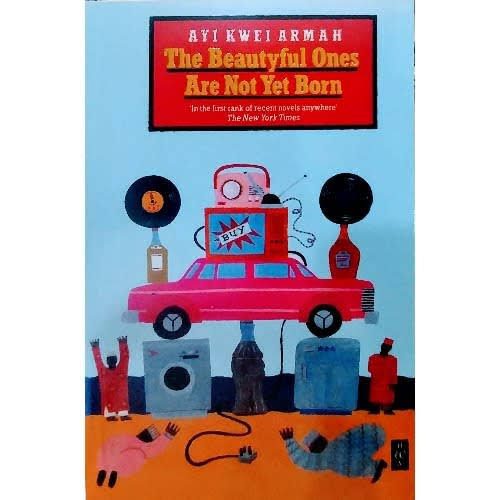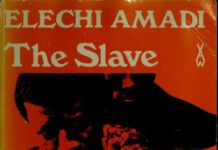Chapter Six
In this chapter of Ayi Kwei Armah’s The Beautyful Ones Are Not Yet Born, the protagonist reflects on the unnatural and sees growth as a natural process. He recalls a childhood memory of “Aboliga, the Frog” who showed him a “book of freaks and oddities,” where his favorite was the picture of an “old manchild” who aged from infancy to old age within seven days before passing away, despite the unusual circumstances.
The narrative then shifts to Koffi Billy, a tired worker who loses his right leg in an accident with cargo steel ropes. Despite his injury, Koffi does not feel any sadness, as he believes he deserves the outcome due to his lack of dedication to his work.
Later in this chapter, three boys in khaki are seen racing up and down a hill and they decide to venture into a white man’s bungalow to search for almonds. They are hesitant to pluck the almonds from the tree and instead gather the fallen ones. As they are leaving, they are chased by a dog and find themselves in the white man’s domain, where they encounter “tall black men” with whips.
In this chapter, several characters are explored, each with their own struggles and insights.
Sister Maanan compares a “bottle of schnapps” to a “bottle of poison and pain.” She cannot see why “wee” should not be condoned since it allows some people “to see beyond the pain of the moment.” She says, “the destructive thing wee does is to lift the blindness and to let you see the whole of your life laid out in front of you” (p. 70). Kofi Billy, Maanan, and the Teacher are all models of the people.
Kofi Billy asks Maanan what will happen, but she only passes the “burning wee” mouth to mouth. They sit on a “breakwater,” at the edge of saltwater, smoking and ruminating dementedly. They leave afterward, and Kofi Billy’s body is found after he commits suicide. The teacher and others feel so sad. The teacher says, “It is not only Kofi Billy that wants to be freed from the world.”
The man listens patiently to the naked man’s story and then asks him why he has refused to move closer to his old friends who are now in power. He waits for no answer, as no one has anything to offer in exchange for their need.
He asks about the “connectedness of words and the freedom of enslaved men.” The naked man replies by telling a tale called “the myth of Plato’s cave” (p. 79). It is a story of impenetrable darkness and chains within a deep underground holding people from seeing anything aside from their shadows and are forced into blindness. Out of this, “an unfortunate being” (says the teacher) broke the chains and wandered outside the lightless cave to see the blinding beauty of the world. He returned to the cave as the first bringer of eternal darkness, entering and sharing his ideas.
The story then shifts to the state of Ghana, recounting how the black leaders have been trying hard to please their colonial masters after their deceit of taking power from the oppressors and ending up as oppressors themselves. A black man once went to the white man to seek power and wanted to be like him. “A new old lawyer, wanting to be white” (p. 84), said Etse.
The story returns to Koomson. The naked man advises the man to consider Koomson, who will make him rich. He begins thinking about Koomson’s sudden change and sees no difference between the whites and blacks after all. “No difference at all between the white men and their apes, the lawyers and the merchants, and now the apes of the apes, our Party men” (p. 89).
Having been disappointed by Koomson’s change of personality, he believes the salvation of the people can be endangered by trusting in a Messiah. Therefore, the people can only liberate themselves. “And there will never be any saviors if each will not save himself” (p. 90).
Chapter Seven
In this chapter of The Beautiful Ones Are Not Yet Born, the naked man and the “student” discuss the harsh realities of society. After their conversation, the “student” leaves, feeling scared and overwhelmed.
The naked man puts on clothes and the “student” decides to leave after much thoughts. The teacher has lost hope, unlike “six years ago.” The “student” is terrified by the superiority complex of Koomson and his family’s extreme desire for wealth. The naked man advises him to stay away from people and “keep quiet,” saying “Life gets very hard when veranda boys are building palaces in a matter of months. If you come near people here, they will ask you what about you” (p. 93).
The naked man expresses his regret for not being able to provide the man with what he needs. He says “I am sorry I have been unable to give you what you need” (p. 93). He returns to his room, leaving the other man alone to ponder his own doom.
The following morning, the man is overwhelmed by his own inadequacy as he thinks about society and the lack of appreciation for hard work.
Chapter Eight
Here, the protagonist walks alone with an unfamiliar companion, weighed down by restless sleep that he now wakes up from “without the mechanical help of the clock” (p. 103). He exhibits a “terrible preference,” waking early to catch the down train from Kojokrom to the station and avoiding transport fares.
Although he ignores his usual habit of greeting the children, he still leaves for work, his wife feigning ignorance of his departure. Upon arriving at his office, he notices some men who, like him, may be “running away from loved ones at home” (p. 105). When the space allocations clerk enters, the man inquires about the early start, but the unsatisfying answer leaves him with more questions.
The protagonist discovers some pencil scribblings on the toilet wall. Among the fascinating phrases are “MONEY SWEET PASS ALL, WHO BORN FOOL, SOCIALISM CHOP MAKE I CHOP, CONTREY BROKE” (p. 106). Although he had seen these scribblings before, he never noticed the companion. As he steps out of the toilet, he encounters “the last challenge assault” (p. 106): “YOU BROKE NOT SO?” Two companion statements follow: “PRAY FOR DETENTION” and “JAILMAN CHOP FREE.”
It is morning, and the day clerks have taken their jobs while senior officers are present. Among them is a supervisor of space allocations who had previously been a bursar at a senior secondary school but was dismissed for gross misconduct related to financial mismanagement.
Later, when the man wakes up to find an innocent boy sitting at his desk, he orders the boy to remain on the seat when the boy abruptly stands up. The boy responds that he is only there to observe and learn. The man looks at the child and reflects deeply, “He will one day wish he had never seen the Block. He will one day wish he had never been born, but not yet” (p. 111).
Chapter Nine
On a Sunday morning, the man wakes up with anxiety and goes back to sleep. The day before, he had gone to the shops to buy expensive drinks and food in anticipation of their upcoming guests and the expectations of his wife, Oyo.
Unfortunately for him, Oyo still complains about the local beer, even though she appreciates the food. She begs the man not to take offence in her reaction and says, “You must know people who could get you these things. After all, people don’t go to school for nothing” (p.116), when she’s expecting foreign drinks such as “the British White Horse Whiskey and Vat 69.” The man had bought beer instead of these drinks.
After the argument, they dust off the cooking utensils such as plates, bowls, and glasses filled with dust and droppings of cockroaches and geckos because it had been a long time since they had important guests. He opens a glass where he sees his bookcase, which reminds him of how he temporarily imagined the Railway Administration job would have been before furthering his education at the University of Legon, and also how Oyo’s pregnancy had interfered.
After cleaning, he looks so disappointed because nothing changes really. After everything and their meal, Oyo seeks her husband’s help to take the children to her mother’s house.
Even though the man doesn’t like to see Oyo’s mother because of her frequent resentment toward his poor fortune, he still goes to avoid another drama. On arrival at her house, the man’s son stumbles and gets his leg stuck on thorns and gets hurt, giving the grandmother enough reason to insult the man more and more.
Chapter Ten
Later, the man returns home before the six o’clock news ends and jokes with Oyo about her appearance. However, Oyo’s mother does not arrive as expected by 7 p.m., and instead shows up with the children just before eight.
To avoid another dramatic encounter with his mother-in-law, the man plans to stay outside until Koomson and his wife arrive. While outside, he runs into his friend Bentil, and they talk until late into the night.
Upon returning inside, the man finds Koomson and Estella already seated. Estella degrades the local beer by stating that it does not agree with her constitution and insists on European drinks. When the man disagrees, Oyo apologizes to prevent her husband from causing a scene. Koomson tells a boring and obscure joke, which the old woman wants more clarification on, but Koomson quickly excuses himself to use the toilet.
The man informs him that they do not have a toilet, but rather a latrine for common use. Oyo is disappointed in her husband’s response, but Koomson does not seem to mind. The conversation then shifts to the main topic of their meeting, which is about acquiring a fishing boat.
Estella begins by derogating the socialists for their excessive corruption of Nkrumah’s government, meanwhile, Nkrumahnists are pretending to be socialists. Koomson elaborates on people’s expectations of socialist ministers.
The conversation eventually returns to the boat, and Koomson explains why money is not that easily made because of the socialists’ noise. They all feign agreement on the matter, despite their individual reservations.
The man is astonished when he learns that the smallest boat costs twelve thousand pounds, and calculates that it would take twelve years to make that amount if each year brought in a thousand pounds. However, Estella carelessly remarks, “What matters is that there will be plenty of fish to eat” (p. 138), despite the fact that poverty is the driving force behind their desire to acquire the boat.
 WHATSAPP: Click HERE to join the new Literature PADI WhatsApp group to receive latest updates on your phone and for further literary discussions!
WHATSAPP: Click HERE to join the new Literature PADI WhatsApp group to receive latest updates on your phone and for further literary discussions!








